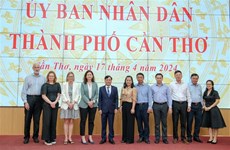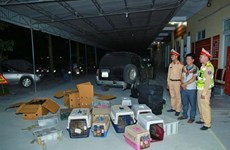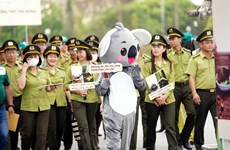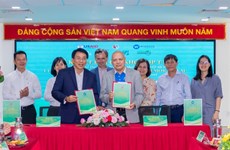Workshop discusses plastic waste collection, recycling
A workshop recently took place in Quy Nhon city, central Binh Dinh province, to discuss the improvement of awareness in plastic waste collection and recycling to promote the circular economy in Vietnam.
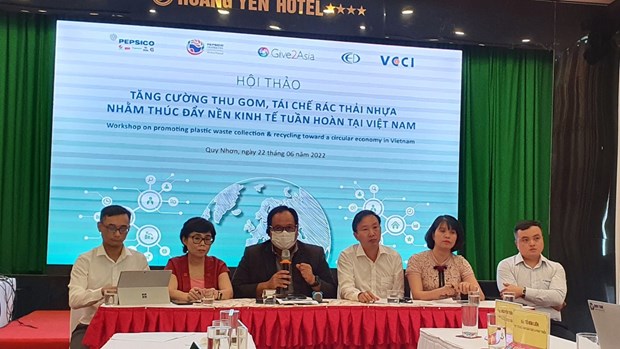 Speakers in the workshop in Quy Nhon city (Photo courtesy of the organiser)
Speakers in the workshop in Quy Nhon city (Photo courtesy of the organiser)The event was held by PepsiCo Vietnam, the Centre of Education and Development (CED), and the Vietnam Chamber of Industry and Commerce (VCCI) - Da Nang branch. It was part of the “Increase awareness in plastic waste management” project funded by PepsiCo Foundation through Give2Asia and implemented by CED in collaboration with partners in Vietnam from January 2020 to December 2022.
One of this project’s objectives is to raise awareness of small and medium enterprises (SMEs) in Vietnam through plastic waste collection and treatment management in order to apply a circular economy model for sustainable business development.
The workshop saw the participation of 70 delegates from producers and importers of food, cosmetics, drugs, fertilisers, animal feed, detergents, etc., in the central region, representatives of the Ministry of Natural Resources and Environment (MoNRE), VCCI Da Nang, URENCO Hanoi, Duy Tan Plastic Recycling Company, and other organisations.
Participants focused on introducing specific regulations and new requirements on Extended Producer Responsibility (EPR) for enterprises and creating a roadmap for the implementation of these regulations; Vietnamese enterprises’ willingness to accept EPR; and current awareness, practices, and specific plans of enterprises to practice EPR.
Jirawat Poomsrikaew, Director of Corporate Affairs for Indochina at PepsiCo, said: "At Pepsico, we are helping to build a positive circular and inclusive positive value chain. We plan to introduce more sustainable packaging into the value chain, and to cut virgin plastic per serving by 50% across our global food and beverage portfolio by 2030. We’ll do this by using 50% recycled content in our plastic packaging and scaling business models that avoid or minimise single-use plastic, like SodaStream, among other levers."
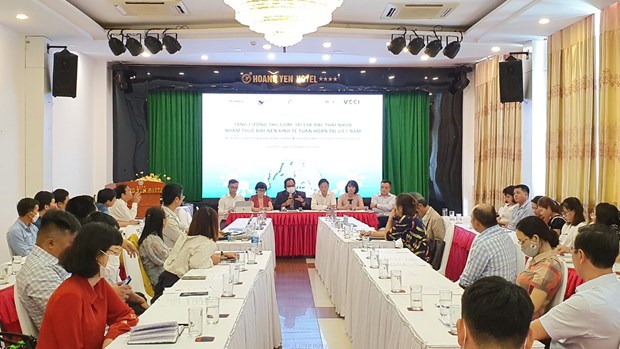 The workshop in Quy Nhon city, Binh Dinh province (Photo courtesy of the organiser)
The workshop in Quy Nhon city, Binh Dinh province (Photo courtesy of the organiser)Nguyen Thi, legal expert from the MoNRE’s Department of Legal Affairs, said EPR is an economic tool and considered a new approach towards the goal of increasing waste reuse, recycling, and reduction by promoting changes in product and packaging design, expanding the capability to use environmentally friendly materials, and looking for financial solutions to handle waste management problems, thereby helping the Government achieve its environmental goals without raising environmental taxes or fees.
Delegates from the MoNRE, businesses, and experts at the workshop also shared with businesses many financial solutions of waste management and recycling.
Nguyen Tien Quang, Director of the VCCI Da Nang branch said EPR is an environmental policy based on the principle of "Polluter pays", noting that it encourages manufacturers to consider environmental issues right from the concept to the design, production and consumption of products, and include waste management costs into production costs.
ERP also opens up opportunities for firms to focus on business and production linked with environmental protection, and encourages them to strengthen linkages and recycle waste, thus contributing to the development of a circular economy model, he added./.









